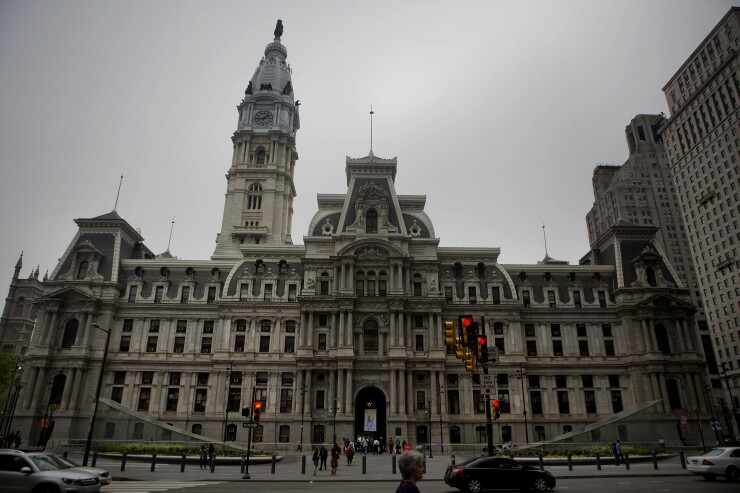As Philadelphia Mayor Jim Kenney gears up for his next budget proposal, city officials are focused on keeping fund balance levels on a healthy track.
Philadelphia’s final 2018 fiscal year fund balance of $368.7 million was $140 million more than projected under the city’s five-year budget plan, according to unaudited financial statements released in October. The better-than-expected surplus was the highest in Philadelphia history and helped the city exceed its fund balance target of 6% to 8% of general fund expenditures.

Director of Finance Rob Dubow said the city is on course to remain at the high end of its fund balance level for 2019 with eyes toward maintaining healthy reserves in the long term.
“It’s a policy we have in general, but the possibility of a downturn in the next two, three, four years makes it even more imperative that we pay attention to that,” said Dubow of the fund balance.
Moody's Investors Service cited improved fund balance levels in November when it revised the outlook on its A2 rating of Philadelphia general obligation bonds to stable from negative. Moody’s analyst Nicole Serrano wrote that Philadelphia’s higher-than-expected 2018 year fund balance was aided largely by tax receipts that exceeded projections, particularly for the wage and earnings tax and also property and real estate transfer taxes.
“While fund balance and liquidity remain relatively narrow versus major US city peers, Philadelphia's current financial position is a considerable improvement over prior years,” Serrano wrote in her report. “Though currently very healthy, the city's revenues have experienced volatility during times of economic contraction, and a more robust fund balance position would allow the city more of a cushion to weather a downturn.”
Fund balances have improved in the three years since Kenney took office and are more than doubled to 3.9% of revenues from 2016, according to Moody’s. The city’s year-ending fund balances were $189.2 million in 2017 and $148.3 million for 2016. Kenney assumed office in the middle of the 2016 fiscal year that ended on June 30, 2016.
“It is good policy to reinforce fiscal stability by building reserves in good times, as Philadelphia is doing, rather than expand spending,” said Janney Capital Markets municipal analyst Alan Schankel. “Growing fund balances will provide some protection from future economic slowdowns, which could negatively impact the city’s revenues due to reliance on economically sensitive wage taxes for a third of city revenue.”
The increased fiscal discipline has positioned Philadelphia to begin establishing a rainy day fund. The city established a rainy day fund policy in 2011, but didn’t create one in recent budget cycles because of projections that year-end surpluses would be too small. A
Dubow said the city is planning a $20 million contribution toward the rainy day fund the next time the city is allowed to under law. The city’s charter currently restricts mid-term contributions into a rainy day fund, but the Kenney administration has proposed legislation to the City Council that would enable rainy day fund contributions at different points of the year.
The focus on sound fiscal practices at Philadelphia City Hall has also involved bracing for the possibility of federal funding cuts under the Trump administration. The five-year plan includes a $50 million annual reserve for potential losses from the federal budget and losses in funding for Philadelphia being a sanctuary city. The current 2019 budget designated a $54.6 million federal funding reserve.
“If we don’t have to spend that reserve we can add that amount back to our fund balance,” said Dubow.
The city is planning to direct a portion of last year’s stronger-than-expected fund balance total to its pension system, which is only 45% funded with $4.4 billion in liabilities. Funding efforts also got a boost from legislation adopted by the Pennsylvania legislature that enables the city to dedicate a portion of its sales tax revenue toward the pension fund with larger contributions than required by law. Dubow said the city is on track through a combination of reforms such as decreased fees, lower discount rates and better investment returns toward a goal of getting the pension system to 80% funded in 12 years.

“All of the steps we have taken are things we think will help us and help insure that the pension fund remains healthy even if there is a downturn," said Dubow.
Philadelphia’s pension burden combined with uncertainty over whether new tax revenues can support the city’s long-term plans for increased school district spending after a
“We’re looking to maintain our current ratings right now,” said Philadelphia City Treasurer Rasheia Johnson. “We are looking to maintain and then solidify our fund balance.”
Philadelphia began borrowing late last year for its “Rebuilding Community Infrastructure”
“There are two more additional tranches of bonds that we are looking to issue but it depends on the pace of the spend-down of the transactions,” said Johnson, who was appointed treasurer by Kenney in December 2015 after heading the Philadelphia office of Siebert Brandford Shank & Co.
Debt service for the rebuild bonds is funded by revenues derived from a 1.5-cents-per-ounce tax on sugar-sweetened beverages that began in 2017. Dubow said market conditions and future beverage tax revenues will determine whether the total bonding ends up being less than the $300 million of borrowing initially mapped out for the program. Revenues from the tax in its first full year in 2018 came in at $77.4 million, 15% less than the $91 million projected.
Philadelphia had $1.6 billion of total outstanding bond debt as of June 30, 2018, according to city officials.





